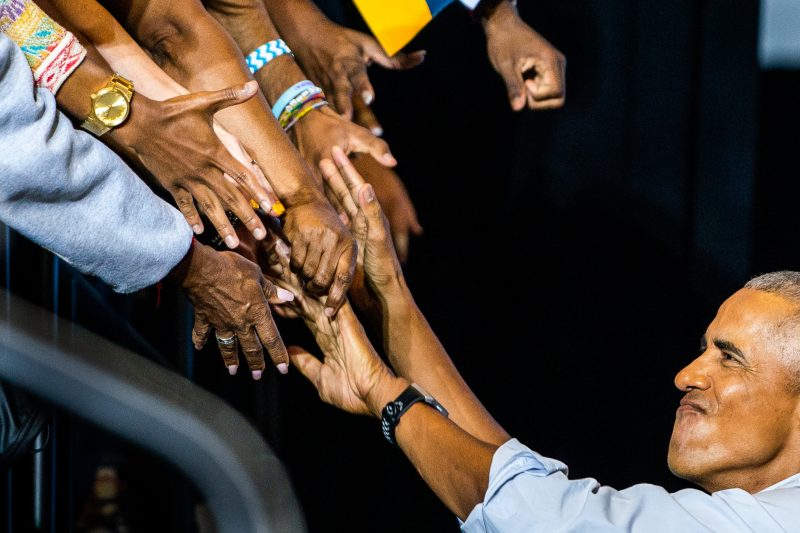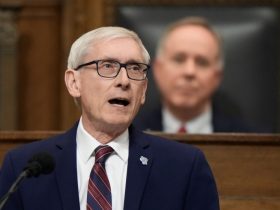CHICAGO — Barack Obama and Kamala Harris first met 20 years ago, when she was the district attorney in San Francisco and he was running for the Senate from Illinois. In 2008, she knocked on doors for him in Iowa ahead of the caucuses that helped propel him to the presidency. On Tuesday night, he will return to his hometown of Chicago to deliver a speech at the Democratic National Convention that he hopes will do the same for her.
Obama arrives at this moment balancing his governing partnership with and affection for President Joe Biden and his friendship with Harris. Having helped engineer, with other party leaders, Biden’s departure from the 2024 campaign, Obama is no doubt determined to remain respectful of his vice president while pointing to a post-Biden future for his party and reviving the sense of hope that marked his 2008 campaign.
His speech will be one of the most anticipated of the week, eclipsed perhaps only by Harris’s acceptance speech Thursday night. He is in a position to do for her what former president Bill Clinton did for him at the 2012 Democratic convention, which was to lay out the rationale for a second Obama term and explain the Obama administration’s economic program to voters skeptical of the pace of recovery after the 2008-2009 recession. Many Democrats remember Clinton’s speech as the best one of that convention.
Obama and his wife Michelle, who will also speak Tuesday night, are at the pinnacle of the Democratic Party, arguably the two most popular Democrats in the country. Since leaving the White House in early 2017, they have pursued parallel but separate paths. He is the political partner in the relationship; she has transcended politics.
“Michelle is in a completely different category,” said David Axelrod, who served as Obama’s chief strategist. “She never thought of herself as ‘in politics.’ She was a conscript. She is even more of a cultural figure.”
The former president’s portfolio has included work through the Obama Foundation, which is now his principal focus. That involves not only completing construction of a presidential library on Chicago’s South Side, but also multiple programs aimed at developing a new generation of leaders here and abroad.
“In addition to the political work he’s doing, this is his top priority,” said Valerie Jarrett, who chairs the Obama Foundation and is a longtime friend and adviser to both Obamas. “He is extremely involved in design of program. He is active in the design of the Obama Presidential Center and is a very effective fundraiser.”
Barack and Michelle Obama have published books since leaving the White House (her two outsold his, which was the first of a two-volume presidential memoir) and teamed up on producing documentaries through a partnership with Netflix and Higher Ground. He has devoted time to the National Democratic Redistricting Committee led by his close friend Eric Holder, who served as attorney general in the Obama administration. The former president also does some paid speaking, though according to an adviser, he does not speak to hedge funds or banks.
If they have not fully eclipsed Bill and Hillary Clinton in the Democratic firmament (Bill speaks on Wednesday and Hillary spoke Monday), the Obamas are certainly the more contemporary couple. They are comfortable with newer technologies and the role of influencers in today’s politics. They have willingly embraced social media’s power to reach a younger generation of people.
Barack, 63, and Michelle, 60, are contemporaries of Harris, 59. Their video call endorsing her not long after Biden quit the race has reached a combined 117 million views, according to an official with knowledge of the relationship between Harris and the Obamas. When Obama hosted a big fundraiser for Biden in Los Angeles earlier in the summer, he spent time with 60 content creators, emphasizing the role they could play in the election.
Since leaving the White House, Obama has been judicious in his involvement in campaign politics. Holder said Obama “does not feel the need to be front and center all the time.”
But he has been drawn into politics more than he perhaps intended as he was thinking about his post-presidency while still in the White House. He was impressed by former presidents George H.W. Bush and George W. Bush in the way they conducted themselves after leaving the White House, choosing carefully when to speak out and giving him room to make decisions even when they disagreed.
“That was his vision of what his post presidency would be,” Axelrod said. “And then Trump came along, and it was impossible to not comment and not be involved in the debate at some level because of the extreme nature of some of the things that Trump did.”
Obama’s presidency never quite lived up to the enormous expectations of his 2008 campaign. Those in the party’s liberal wing criticized him as not being boldly progressive enough. Some were disappointed with his willingness to compromise or even seek compromise with a Republican Party that became more intractable as his presidency went along.
Another criticism of Obama was that he neglected his role as a party builder, that for all the talent and energy he poured into his own campaigns, he did little to help nurture the Democratic Party’s infrastructure. In the midterm elections of 2010 and 2014, Democrats suffered major losses. By the time he left office, the party appeared hollowed out.
“Since his term ended, some of his promise and contribution to American politics and history have come back to people’s minds,” said Princeton University historian Julian Zelizer. “In part, the contrast with Trump was so great. There was more appreciation of what Obama stood for, more appreciation of what he accomplished, as the radicalization of the Republican Party became clear.”
Holder said that since leaving the White House, Obama has seen work on behalf of the party as an essential responsibility. “He did as much as he could when trying to run the nation,” Holder said. “Now he has more time and his role has changed.”
Obama has helped raise money for the redistricting committee and has worked with Holder on the issues of gerrymandering and voter suppression, both seen as ingredients in the effort to rebuild the party at the state, local and national levels.
Obama offers counsel to various younger politicians. “He advises in a quiet way,” Holder said. “This is unpublicized.”
That unpublicized work includes advice and counsel to Harris, which has been ongoing throughout the Biden presidency and has increased over the past month as she moved to head the Democratic ticket.
Obama had followed Harris’s career as she moved from being district attorney to California state attorney general. Holder said that when he was preparing to leave the Justice Department in 2015, Obama discussed Harris as a possible successor. Holder said he called Harris to gauge her interest. Eventually, Obama chose Loretta E. Lynch as Holder’s successor, at a time when Harris was contemplating a campaign for the Senate, a seat she won in 2016.
“We’ve known each other for 20 years. I’ve watched how you have excelled in every position you’ve been in,” Obama told her in the phone call in which he and Michelle Obama formally endorsed her candidacy for president last month. “Just to see all that hard work be recognized is something that we couldn’t be more thrilled about. And so the main thing we wanted to do was just let you know and let Doug [Emhoff] know, our soon-to-be first gentleman, that we are gonna do everything we can to help propel you into the presidency.”
Eric Schultz, senior adviser to the former president, said, “President Obama believes this is an all-hands-on-deck moment and is committed to doing all he can to elect Vice President Harris and Democrats across the country. His strategy this fall will be driven by where he can move the needle with Democrats and persuadable voters, especially in states with key races.”
Obama played a role in Biden’s ultimate decision to stand down as a candidate, acting as a sounding board, according to those familiar with his role. But if Biden was looking to Obama to counter efforts to encourage him to quit the race, the former president did not oblige.
A source familiar with the Obamas’ speeches said the former president “will affirm why Kamala Harris and Tim Walz are precisely the leaders the country needs right now,” while Michelle Obama “will lay out how Kamala Harris is ready to lead our country forward and turn the page on fear and division.”
Obama would have given a robust speech if Biden were still the candidate. But as one former Obama adviser put it, “It would have been tougher, as much as they are friends, because of all the questions that hung over the candidacy that had no answer. It’s very hard to talk about the future if people don’t think your candidate is a part of it.”
Those who know Obama say he will await recommendations from the Harris campaign about exactly what role he should play this fall — when and where he should go — rather than inserting himself without being asked. Having David Plouffe, who was his campaign manager in 2008, now as part of the Harris campaign will make that easier. “He’s on the receipt mode,” said one Obama adviser. “The campaign is running the show.”
Other former Obama aides are working for Harris now, including campaign chairwoman Jennifer O’Malley-Dillon and senior adviser Stephanie Cutter.
Former advisers say that, in his speech, Obama can try to re-create some of the mood and tenor of his 2008 campaign as well. Rahm Emanuel, Obama’s first White House chief of staff and currently U.S. ambassador to Japan, said, “He can speak to our better angels,” offering a stark contrast with the current political environment.
“This moment is not unlike the time when he was active in national politics,” Axelrod said. “It was about the war and economy, but it was also about people who really wanted to turn the page on rancor and the grinding politics of Washington.”
Harris ultimately will have to try to create that mood herself, but on Tuesday night, her campaign will be looking to both Obamas to try to turn the country in a new direction.








